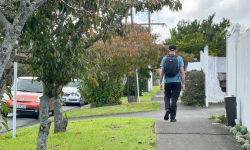
Andrew Clark-Howard’s assessment of the anti mandate protest (What we owe each other: freedom, protest, and responsibility) draws upon excellent resources from Bonhoeffer on freedom. But his application of that definition only tells half the story. In this rejoinder I wish to shed light on the impetus behind the protest, and suggest a wider perspective is needed when we consider responsible action.
Freedom and responsibilities
Bonhoeffer’s vision of freedom is compelling. For followers of Jesus, true freedom cannot mean autonomy. Slavery to Christ and His cruciform way, laying one’s life down for the sake of another. Selflessness is freedom. Rights language divorced from responsibilities is similarly unChristian. A shaky social foundation and an anemic way to find meaning in life. As Bonhoeffer puts it in his Ethics:
“only those who are selfless live responsibly, which means that only selfless people truly live.”1
Exactly because of these definitions, I sympathize with the protestors.2 Like them I have concerns with the ethics of mandated vaccination, and with the social, economic, and moral impacts that have already, and will likely result.
Some questions
Here are some of the questions I’ve asked myself:
- Would mandated vaccinations be a moral good outside of a crisis?
- If they are acceptable under some circumstances, how do we know when the conditions are met?
- How will we know when they’ve ended? What assurances have we been given that they won’t be used outside of a crisis
- What measures are acceptable to enforce compliance? Loss of jobs? Restricted access to some services? These have been articulated as health precautions, but they are functionally punitive.
- What about deliberate punitive measures? Fines? Prison time? These are real-world examples announced in Austria; it remains to be seen whether they will be implemented.
- What about forcibly holding down the unwilling to inject them?
- What about mandated vaccination of children?
- Should the state violate parental consent to advance that aim? What would it mean for a government to take that control within the family unit?
- What if mandated vaccination led to encroachments over other ethical boundaries?3
- How far would be too far? How would we know when to say ‘no’?
- How many times saying ‘yes’ to ethically questionable mandates would it take before we lost the discernment and moral courage to say no?
Government responsibility
As I have pondered those questions, I’ve come to think that vaccination mandates are dangerous and wrong, because they transgress the boundary between government and the society it is called to serve.
In democratic countries we rightly draw boundaries around state power. Sometimes this employs the language of rights. But you can also interpret these rights as boundaries defining the responsibility of the government to ensure certain lines are not crossed. Government, after all, just as the individual, holds its rights, powers, and freedoms for the sake of others.
This is the central issue with vaccine mandates. Despite naming themselves the ‘Freedom Convoy’, an alternative reading of the impulse behind the protests is their concern with the responsibility of the Government to serve all of its citizens, and to limit itself.
But what about the vulnerable?
Clark-Howard states that we ought to especially care for the vulnerable. I agree. Those who are at higher risk of harm from covid need extra protection and care. I am not opposed to all covid measures. But there is more than one sort of vulnerable person in this picture. And the mandates have created an entirely new substrate of vulnerable people.
They have been ostracized and unable to participate fully in society. Very rapidly, the language of “the unvaccinated” began to sound like the language of leprosy. ‘What are we going to do with the problem of the unvaccinated?’ By comparison, the vaccinated are lauded for their high moral status. They enjoy the privileges of society because ‘they did the right thing.’ This messaging is moral formation straight from the top.
Many people want no contact with those who haven’t had the jab. I can empathize with their health concerns, but what does that do to social cohesion?
Many have lost jobs, income, and missed opportunities. There’s a class component here, because obviously this affects poorer people far more than the wealthy, who may at least have some financial insulation. Casual dismissal of economic impacts is a chilling example of bourgeois indifference.
Māori vaccination rates have been low and slow to pick up. One commentator, early on after the mandates were announced, pointed out that many Māori – especially up north and on the east coast—simply do not trust that the Government has their wellbeing at heart. My guess is these mandates have done little to repair that trust.
To cap it off, the unvaccinated have routinely been told that they only have themselves to blame. These consequences are because “they chose to be unvaccinated.” The logic and psychology of that compassionless utterance is disturbing. From my perspective, they chose nothing. Rather a choice and its consequences were foisted upon them. To say they chose their consequences is like a mobster telling the shop owner they have a choice between paying up, or having their windows smashed.
Judgement and grace
Back to Bonhoeffer’s Ethics. He describes two ways that responsibility on behalf of another can be corrupted:
“by absolutizing either my own self or the other person.”4
Absolutizing the self is exactly the danger Clark-Howard warns us about when we define freedom as autonomy. But there is another risk:
“In the second case, the welfare of the other person for whom I am responsible is made absolute while ignoring all other responsibilities. This leads to an arbitrariness in my action, which makes a mockery of my responsibility before God, who in Jesus Christ is the God of all people.”5
Coronavirus is serious. So are these other impacts. I fear the government’s myopic mandate approach risks great harm to vulnerable people and society as a whole.
In the end
Ultimately, whether the mandates are the best choice possible, a necessary lesser evil, or something quite dangerous, only God knows. I would not claim to know either what Bonhoeffer would think. But his writings have taught me that in complex moral situations I must make the most responsible choice I can imagine, and submit myself to the mercy and judgment of God. That is all any of us can do.
It is clear that the mandates have had numerous negative consequences, some obvious, some untold, and some that remain to be seen. They have fomented discord and division, and required many of us to do things we believe to be wrong, like turning people away from Church. Lord Jesus Christ, Son of God, have mercy on me, a sinner.
I lament that the protestors in Wellington, at least the best of them, have been misunderstood and often misrepresented. I do not think they are ultimately a crowd of selfish and rights-obsessed people.
I think they feel in their bones that this path is dangerous, not just for themselves, but for all of us.
I feel it too.
Contributor: Mark Day is the Senior Pastor at Hillcrest Baptist Church in Hamilton. Mark would like to make it clear that the views expressed above are his, and not necessarily those of the diverse church community where he is called to serve.
References:
- Bonhoeffer, D, Ethics (Fortress Press, 2005) Chapter: “The Structure of the Responsible Life”, accessed on Kindle.
- To be clear about what I’m not saying: I am not opposed to vaccination, nor do I have concerns with this particular vaccine. As to the behaviour of the protestors, I do believe there is a time and place for the Christian to engage in civil disobedience, but not with violence. I condemn any abuse, harrassment, or threats, and call all protestors to engage peacefully.
- Anticipating the claim that this is a slippery slope line of thinking, please note that I am not saying I am certain or even suspicious that this will happen. However, it is not unreasonable, when someone takes a step in a certain direction, to wonder about how many more steps they might take, and what the consequence of each step would be.
- Ethics, Ibid.
- Ethics, Ibid.


